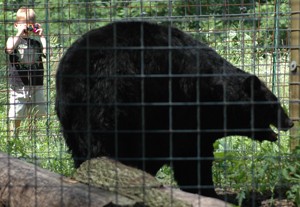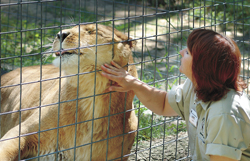 In the heart of Noble County, a sanctuary offers a little “R and R” for animals. But here, that stands for “rescue and retirement.”
In the heart of Noble County, a sanctuary offers a little “R and R” for animals. But here, that stands for “rescue and retirement.”
The Black Pine Animal Park provides a permanent home for former performing circus animals and displaced exotic “pets.” And while caring for these animals, park personnel stress responsible pet ownership to all the visitors who come see these unusual animals up close in an intimate zoo-like setting.
“If you enjoy visiting animals,” said Lori Gagen, Black Pine’s interim executive director, “Black Pine is doubly rewarding. You get an intimate experience with the animals, and you’re helping fund their care and making a difference in their lives.”
The non-profit park, established in 1995, is home to 79 animals of 50 different species. They include a camel, lions, tigers, a black bear, a variety of primates including two chimpanzees, reptiles and exotic birds. One bird, Peaches, made national news recently because of its somewhat “colorful” vocabulary. The animals have come from as far as Texas, but most come from Indiana, Ohio and Illinois.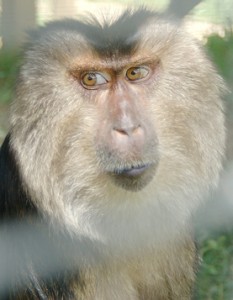
The park moved to its 18-acre site, which it leases from the county, west of Albion in late 2006 after it suddently lost its original lease on private land and faced closure.
“Without the county and community support, we would not be here,” Gagen said. “They rallied and made it possible for us to move and vastly improve everything for the animals and our guests.
“We’re thrilled with where we are, but I don’t think people realize what we’re doing with so little resources,” Gagen said.
The park relies on 40 active volunteers and donations from the community. Black Pine also recently sponsored a fundraiser with noted animal handler Jack Hannah who put on shows at both Black Pine and in downtown Fort Wayne.
New structures are being at the new site as donations allow. Most recently, a local business donated the reptile house — home to an alligator, tortoises, snakes, iguanas and others — that are viewable in zoo-like enclosures.
Noble REMC’s voluntary consumer-supported community fund, Operation Round Up, has made several grants to the park over the years. A recent grant helped pay for signage around the park allowing visitors to learn more about the animals they’re seeing. For many folks, a trip to Black Pine is the first time to be so close to so many of these exotic animals.
Black Pine receives some 150 calls each year from people no longer wanting their exotic pets. Sadly, Gagen said, most have to be turned down because resources are so tight.
She said sometimes a person will call expecting Black Pine to not only be willing to take in a unique animal the caller no longer wants but to be excited about being offered the animal as if it would be a prize addition.
Some animal sanctuaries do over extend themselves by taking in too many animals, she noted. That makes it bad for the other animals already in their care.
“We are constantly having to say ‘no,’ and it just rips our hearts out,” Gagen said. “But we have to be responsible.”
“We can only move as fast as our funding,” summer intern Mikel Peña noted to a recent group of visitors.
That’s where the education comes in.
Pitfalls of exotic animals
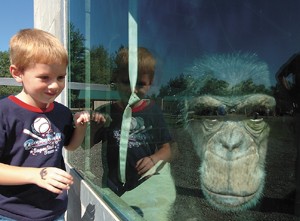
Aidan Dreibelbis of Albion gets a close up look at Tarzan the chimpanzee through a tinted window at Black Pine Animal Park, a retirement and rescue center for exotic animals.
The Internet has made exotic animals more accessible. People can easily buy them on impulse. Unfortunately, they then just as quickly abandon them when they realize the care and diet these exotic animals require, or the size they become as adults, the lifespans they live or the smells they create and leave.
At the bobcat enclosure, under a shady canopy along a trail where many of the big cats are kept, for instance, Peña told a tour group that a bobcat is not just a slightly bigger version of a house cat as some people — especially those who think it would be fun to have one — might initially think.
He warned folks to watch out and step away from the wooden fence along the trail if their rescued bobcat came out of its shelter house and turned its backside to them through its wire-fence enclosure. That means it would be about to spray a powerfully pungent urine to mark its territory. Almost on cue, the bobcat came out and sprayed several feet outward. No tomcat ever left a smell like that.
It’s typical of the types of things an average person wouldn’t realize about an exotic animal until it was too late.

Mikel Peña leads a group of visitors at Black Pine past one of the tiger enclosures. Peña, a high school graduate from nearby Ligonier, is interning at the park this summer on a diversity grant to translate and help make the park’s messages and outreach more inviting to the Hispanic community in the area.
“People don’t realize what they’re getting into. It’s like having a 2-year-old for about 70 years,” Peña told his tour group. “They get bigger and live longer and have certain needs that people don’t want to take care of.”
“Just because you can get it readily doesn’t mean it’s a good idea,” Gagen said. “It’s a living being, and you should approach it that way. You should only have these animals if you are fully informed and equipped to take care of them.
“We would be most excited if we never got another phone call again,” she added. “We would like to not have to be here, but we’re needed. Pretty much every place like us is filled to the gills.”
Black Pine Animal Park
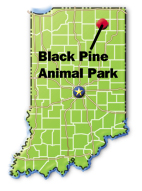 1426 W. 300 N.
1426 W. 300 N.
Albion, IN 46701
Hours: 10 am-5 pm daily through Labor Day. Guided tours at 11 am and 3 pm. Open only by appointment Labor Day to Memorial Day.
Admission: $7 ages 13-55; $6 ages 3-12; $6.50 ages 55 and up. Discounted group rates; field trips; summer workshops for ages 3-12; job shadows for ages 12-15; and internships for 16 up are available.
Contact: 260-636-7383; BlackPineAnimalPark.com.

